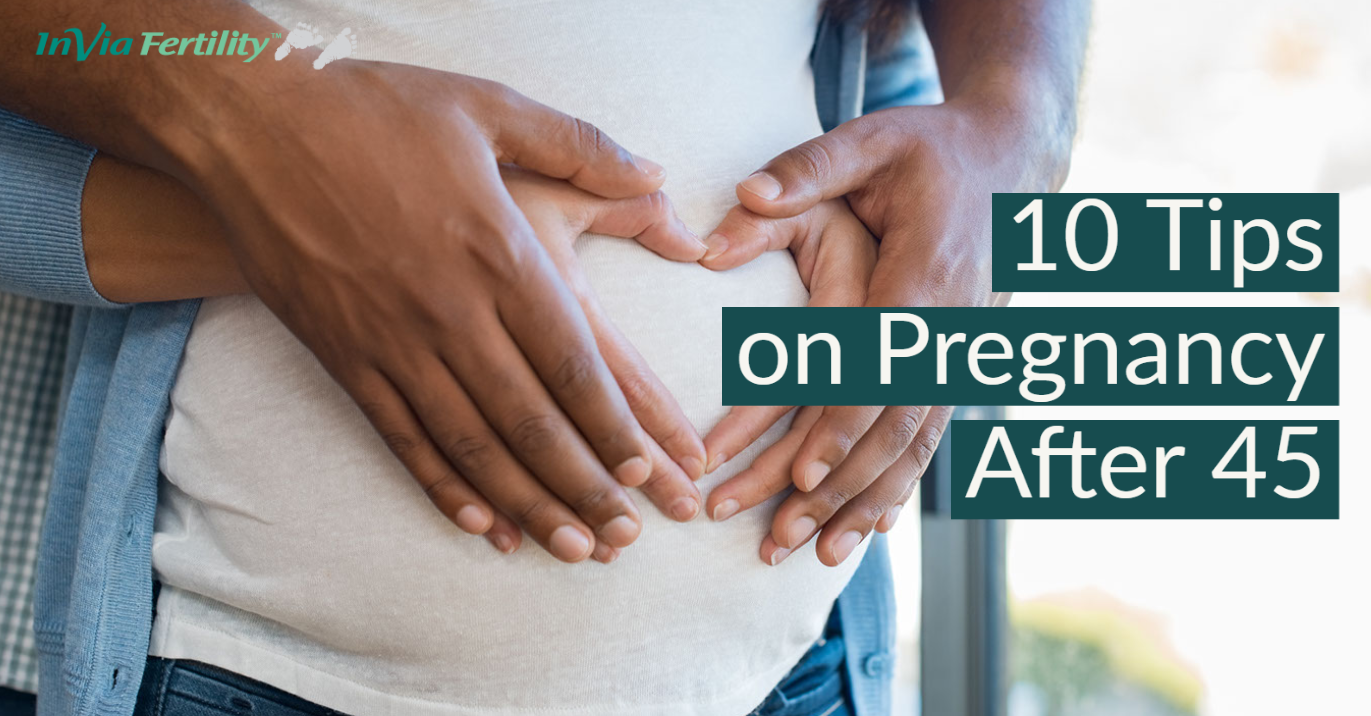Today it has become increasingly common for women to achieve their educational goals, find a partner, and establish a career path before they consider having children. It often takes years to obtain these goals--years which include a woman's most fertile period from age 15-30. Women who begin trying to concieve between the ages of 35 – 45 will have to face the fact that their fertility has already started to decline. In previous blogs, I have discussed the fact that after age 40, fertility declines precipitously, and have described treatment options for this age group. But what about women seeking pregnancy after 45? What are the treatment options available? How risky are these pregnancies?
Here are the top 10 facts about pregnancy after 45:
- You could conceive naturally, however, the chances are low. There is a 50% rate of miscarriage and increased risk of having a baby with chromosomal abnormalities (e.g. Down syndrome or Trisomy 21). Trisomy 21 risk is 1 in 1,000 in women aged less than 30 years, but rises to 1 in 30 by age 45 years.
- The pregnancy rate with IVF using your own eggs is practically zero. We have had several patients at InVia insist on trying IVF with their own eggs. We have not had a single live-birth in women above age 45 years. An exception is a report of a 50 years old woman in India who recently had a live birth with IVF!
- The number of women who are having babies after age 45 years is increasing. The increase in pregnancies is mainly due to the use of donor eggs in this group of patients. The pregnancy rate using donor eggs is excellent and exceeds 60% per transfer.
- Donor eggs aren't the only alternative conception solution. Other options that can be considered include donor embryos and adoption.
- At InVia, we will require patients above age 45 years to have medical clearance for pregnancy prior to being accepted in our egg donor recipient program. This includes CBC, complete metabolic panel, and a stress EKG. We will also have them see a maternal-fetal medicine specialist for a pre-conceptional consultation and a psychologist for a screening visit.
- Most women attempting pregnancy after age 45 are fit, have a healthy lifestyle and diet. Despite this, pregnancies in these women are considered high-risk and have an increased risk of complications. Dr Mark Sauer from Columbia University, New York recently reviewed the Nationwide Inpatient Sample profiling American births for years 2008–2010, the associated risks, both medical and obstetric, are significant as women age, including the risk of death. Although the absolute risks were relatively low, the severity of the morbidity and the possibility of mortality remain important concerns. Pregnancies to women older than 45 years represented only 0.19% of all pregnancies yet accounted for up to 2% of the deaths or severe cardiac events. There is also an increased incidence of pregnancy-induced hypertension (relative risk [RR] 2.8), diabetes (RR 14.2), cesarean delivery (RR 4.1), and perinatal mortality (RR 2.4).
- In the two published series focused on mothers older than 50 years the same obstetric problems emerged. The University of Southern California experience profiled a decade of work and noted that one-third of patients developed mild or severe pre-eclampsia; 20% experienced gestational diabetes; and 78% required cesarean delivery, one of which was accompanied by hysterectomy. Dr Sauer’s experience at Columbia University with 101 women (aged 50–59 years) noted hypertensive disorders in roughly one-quarter of the patients; diabetes in 4%; 87% required cesarean delivery, one of which was accompanied by hysterectomy; and one first-trimester death likely secondary to a heart attack. A death was also previously reported in a 50-year-old woman from The Netherlands who suffered an eclamptic seizure after the cesarean delivery of twins and died from cerebral hemorrhage.
- Generally speaking, age itself is no longer a natural barrier to pregnancy, and patients well beyond menopause are seeking fertility services in moderate numbers. There have been reports now of 70-year-old women achieving pregnancy with donor eggs. A relevant question is whether it is ethically acceptable to do this. At InVia we will not accept patients after the age of 52.
- Multiple pregnancy is another problem that needs to be discussed. Carrying twins in this age group is a challenge. However, physically being able to care for two children at the same time could be an even bigger challenge. At InVia we have a policy of elective single embryo transfer in women above age 45 years.
- There are several psychosocial issues with pregnancy in this age group that are important to consider as well.
To see a board-certified physician who is skilled and experienced with later-in-pregnancies, schedule an appointment at one of our four Chicago area fertility clinics.



